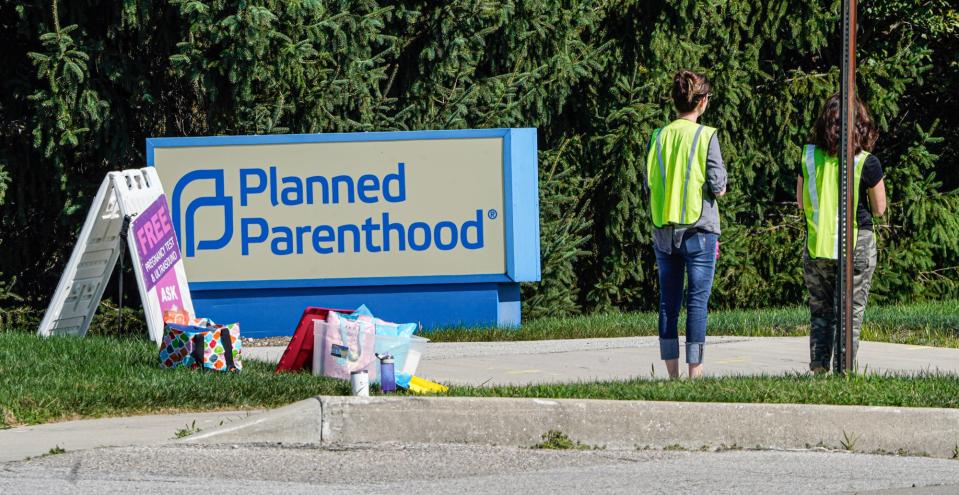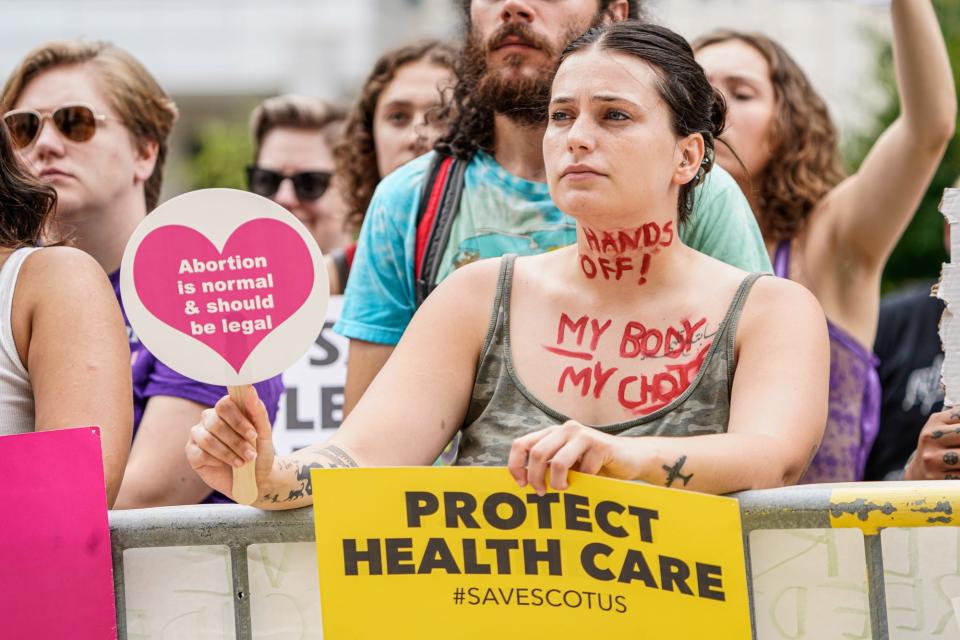What you need to know: Indiana abortion law begins
Today marks the day that Indiana’s near-total ban on abortion takes effect. Gov. Eric Holcomb signed the new policy into law in early August after the Indiana General Assembly passed the measure during a two-week special session.
As Indiana enters new territory in the area of abortion law, it's hard to know exactly how the law will play out. However, here's what we know at this time:
When is abortion legal in Indiana?
The new law bans abortion in most instances at zero weeks of life. The only exceptions are in the case of fatal fetal anomalies, if the life or serious health of the mother is at risk and in cases of rape and incest. Victims of rape or incest may have an abortion up to 10 weeks post-fertilization. In those instances, the physician performing the abortion will have to certify in writing that the pregnancy being terminated was the result of rape or incest.
Indiana abortion law:Inside all of IndyStar's coverage of abortion in Indiana since Roe v Wade decision
How many exceptions to the law will there be?
Abortion care providers say it's difficult to predict how many abortions will performed in Indiana under the new law
Last year, 8,414 abortions occurred in Indiana, according to the Indiana Department of Health's annual pregnancy termination report. The report does not include information on how many of those abortions were performed for any of the instances allowed under the new law.
ACLU files two lawsuits to try to block abortion law
In the weeks leading up the law going into effect, the ACLU has filed two lawsuits trying to stop it. The first, which was filed two weeks ago on behalf of Planned Parenthood and abortion providers in Monroe County Circuit Court, says that the law interferes with a woman's right to privacy, which is protected by the Indiana Constitution. A hearing is scheduled for Monday.
Last week, the ACLU filed another case in Marion Superior Court that argues that the new law runs afoul of the state's Religious Freedom Restoration Act. That case, which includes Jewish, Muslim, and non-theistic spiritual anonymous plaintiffs, notes that not all religious beliefs hold that human life begins at conception.
'I love Jesus:'Christian lawmakers legislate their faith into Indiana abortion ban

What new law means for clinics that provide abortions
Under the new policy, abortions only can be performed in hospital settings. The vast majority of abortions performed in Indiana historically have occurred in free-standing abortion centers. In 2021, for instance, 98% of all abortions took place in one of the state's seven abortion clinics.In advance of the law taking effect, many of the free-standing abortion clinics in Indiana planned to close their doors. Planned Parenthood officials said that their clinics, however, which provide a wide-ranging array of reproductive health services would remain open.

What new law means for hospitals that provide abortions
Indiana University Health, the state's largest hospital system, said that the new law prompted hospital officials to develop new policies in anticipation of the new law. Officials could not provide an estimate for how many patients will seek abortions in the coming year; in 2021 the four IU Health hospitals that performed abortions accounted for just over 60 of the procedures done in this state.
Because under the new law, a provider who performs an abortion deemed to be illegal could face up to six years in jail and a $10,00 fine, IU Health has created a 24/7 rapid response team to handle provider questions that may arise. The team consists of a clinician, a person with legal expertise, and a person with legal expertise
Some in the medical field have expressed concern about the impact that the new law will have on recruiting new providers to the state and on training future OB-GYNs here.
What abortion law could mean for adoptions
During the special session, the Indiana General Assembly also passed a bill allocating $75 million for child services. Of that fund, $45 million will go to establish a Hoosier Family Fund, $10 million to expand the Nurse Family Partnership program, $10 million to the Child Care and Development Fund voucher program, more than $5 million to the Safety PIN grant fund and $2 million to Real Alternatives, which is a crisis pregnancy organization.
Indiana abortion ban: ‘Predatory’ and ‘dangerous’ anti-abortion clinics will expand in Indiana
Despite the new funding, some children's advocates in the state said that they wanted the state to go further to help pregnant people as well as children already in the foster care system and children waiting to be adopted.
Is Indiana the only state to pass such a law?
Indiana was the first state to pass additional abortion restrictions in a special session in the wake of the Dobbs decision that overturned Roe.
However, other states have followed in Indiana's footsteps since the law passed. Earlier this week, West Virginia passed a law similar to Indiana's that allows exceptions in the case of rape and incest until eight weeks only in cases in which the assault has been reported to law enforcement.
Can the abortion law change?
It's possible that one or both of the ACLU lawsuits could result in changes to the law.
It's also possible that the Indiana General Assembly when it comes back into session in January could make further amendments to the law, making it more or less restrictive depending on the tweaks proposed and how the majority of lawmakers votes.IndyStar staff reporters Kaitlin Lange, Arika Herron, Rachel Fradette, Lizzie Kane and Johnny Magdaleno contributed to this report.
Contact Shari Rudavsky at shari.rudavsky@indystar.com or on Twitter: @srudavsky.
This article originally appeared on Indianapolis Star: Indiana's abortion law begins: When it's legal, changes, what it means

